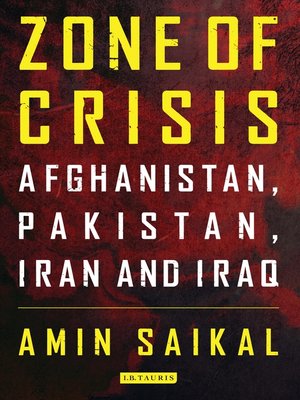
Sign up to save your library
With an OverDrive account, you can save your favorite libraries for at-a-glance information about availability. Find out more about OverDrive accounts.
Find this title in Libby, the library reading app by OverDrive.



Search for a digital library with this title
Title found at these libraries:
| Loading... |
The West Asian states of Afghanistan, Pakistan, Iraq and Iran have over the last few decades represented an arc of crisis. Characterised by fractured and dysfunctional political elites, fraught economic policies, and ideological struggles between the forces of authoritarianism and democratisation, neo-fundamentalism and pluralism, they embody a mosaic of ethnicities. Amin Saikal, a distinguished Afghan-born scholar of international affairs, provides a sweeping new understanding of the complex contemporary political and social instability encompassing the region. Saikal takes the reader on a journey throughout the history and current affairs of the four countries, highlighting how these states have been repeatedly invaded by major powers such as Tsarist and Soviet Russia, Great Britain and the United States. With each seeking, often in competition with one another, to redirect the domestic and foreign policy objectives and priorities of this region in accordance with their individual geopolitical and ideological preferences, the region finds itself today in a state of crisis.
Critically comparing democratisation and counter-insurgency efforts in Afghanistan, Iraq and Pakistan, and examining both recent Western intervention and the history of foreign influence in the region, this book looks at how US entanglement has affected Pakistani and Iranian domestic politics and foreign affairs. How has this influenced the success or failure of the occupation in Afghanistan and Iraq? What solutions can be taken to ensure regional security? Despite the critical importance of historical legacies in understanding present-day Afghanistan, Pakistan, Iraq and Iran, the past has often been overlooked or misunderstood by outsiders, with frequently serious consequences. An improved understanding of the region among foreign policymakers is imperative to enhancing prospects for stability and mutually beneficial international relations. Bearing this in mind, Zone of Crisis offers an informed and balanced overview on a troubled region. This book will fascinate general readers and prove essential reading for specialists.
Critically comparing democratisation and counter-insurgency efforts in Afghanistan, Iraq and Pakistan, and examining both recent Western intervention and the history of foreign influence in the region, this book looks at how US entanglement has affected Pakistani and Iranian domestic politics and foreign affairs. How has this influenced the success or failure of the occupation in Afghanistan and Iraq? What solutions can be taken to ensure regional security? Despite the critical importance of historical legacies in understanding present-day Afghanistan, Pakistan, Iraq and Iran, the past has often been overlooked or misunderstood by outsiders, with frequently serious consequences. An improved understanding of the region among foreign policymakers is imperative to enhancing prospects for stability and mutually beneficial international relations. Bearing this in mind, Zone of Crisis offers an informed and balanced overview on a troubled region. This book will fascinate general readers and prove essential reading for specialists.






